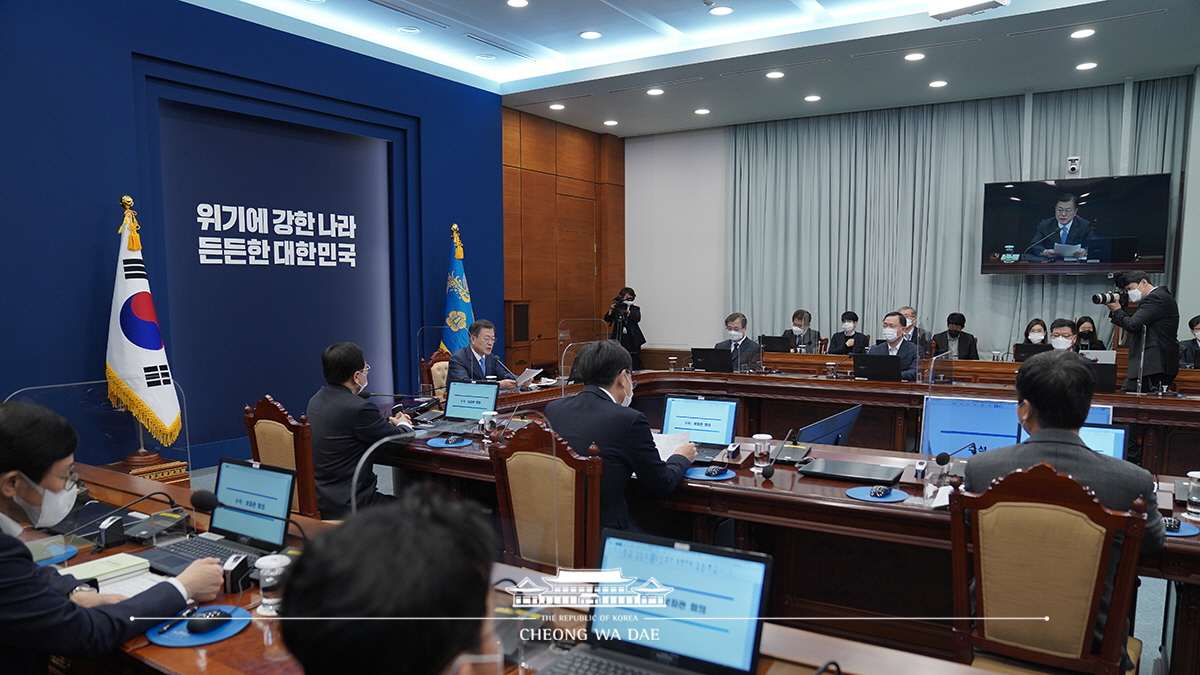이 웹사이트는 제19대 대통령 임기 종료에 따라 대통령기록관이 「대통령기록물 관리에 관한 법률」에 의해 이관받아 서비스하는 대통령기록물입니다. 자료의 열람만 가능하며 수정 · 추가 · 삭제는 불가능합니다.
다만, 「개인정보보호법」에 의하여 개인의 정보를 보호받기 원하시는 분은 관련 내용(요청자, 요청내용, 연락처, 글위치)을 대통령 웹기록물 담당자(044-211-2253)에게 요청해 주시면 신속히 검토하여 조치해 드리겠습니다. 감사합니다.
SPEECHES & REMARKS
BRIEFINGS
Opening Remarks by President Moon Jae-in at Meeting with His Senior Secretaries

Two outside experts are joining us today to discuss an item on the agenda: Professor Lee Jeong-dong, Special Advisor to the President for the Economy and Science, and Professor Lee Keun, Vice Chair of the National Economic Advisory Council. I believe Professor Lee Keun was just recently appointed to that position. Congratulations. Let’s welcome them with a round of applause.
I am grateful to the people for actively cooperating with the special epidemic prevention and control measures taken during the Lunar New Year holiday. The Government has downgraded the social distancing levels that have been heightened for over two months. This long-considered decision aims to balance effective epidemic prevention against daily routines and against people’s livelihoods. Our anti-epidemic and medical systems have been judged capable of controlling the current situation.
In particular, we had to take into account the urgent issue of people’s livelihoods. The enhanced epidemic prevention and control measures that have lasted for over two months are making people increasingly weary. Prolonged bans or restrictions on business operations have pushed the livelihoods of microbusiness owners and the self-employed to the edge of a cliff. We were no longer able to ignore the desperate pleas to give their businesses at least a small amount of breathing room.
The Government will devise a new social distancing plan and implement it from March when vaccinations will begin in earnest. Such compulsory blanket measures as bans on gatherings and business restrictions will be minimized, but strict restraints will be imposed on any activity and act that violates anti-epidemic guidelines.
Even after vaccinations roll out, the battle against COVID-19 is bound to stretch into a long war. The pandemic has persisted for more than a year already, and we have to continue to live with the virus for an extended period. Under this situation, we cannot keep putting financial burdens on certain groups, such as microbusiness owners and the self-employed. For sustainable epidemic prevention and control, we have to find ways to maintain both anti-epidemic efforts and people’s livelihoods.
We intend to shift now from compulsory, across-the-board measures to epidemic prevention and control based on voluntary and responsible participation. The aim is to further enhance individual responsibility while expanding autonomy to broaden sources of livelihood. With regard to violating anti-virus guidelines, a “one-strike” system and other more enhanced means will be taken to prevent any breach of epidemic prevention and control.
Measures that prize autonomy and responsibility are a new challenge for us. Whether they succeed or fail depends on the maturity of our people’s civic awareness. I have faith in them. Once vaccines and treatments are combined with autonomy- and responsibility-based anti-epidemic endeavors, we’ll be able to accelerate the recovery of our economy and daily routines.
As predicted, employment statistics also confirmed that we are now facing the direst employment situation since the 1997-1998 Asian financial crisis. In particular, employment polarization has intensified further. Nearly 900,000 jobs – primarily in face-to-face service industries – were lost, and temporary and day laborers accounted for most of the decline in employment. Employment numbers for women and young people are still falling. Economic growth continues to rebound for the second consecutive quarter, but it will take more time for jobs to come back.
Cognizant of the severity of the employment difficulties, the Government will mobilize every possible means for an all-out response, for instance, by frontloading the budget for job creation and strengthening the employment safety net. In the face of the most serious employment crisis ever, I urge you to devise – with extraordinary resolve – additional measures that go beyond those that have been planned and prearranged. I also ask you to allocate sufficient funds for job creation in the supplementary budget to be discussed going forward, which will include the fourth round of emergency relief payments. Special measures should also be devised quickly to improve the employment situation for young people and women.
When the private sector faces difficulties, the Government has no other choice but to serve as a pump-primer to maintain and create jobs. However, complete job recovery should ultimately occur in the private sector. The Government will do all it can to increase economic vitality along with enhanced support for investments in order to create conditions that will help private companies actively create jobs. I urge all of the ministries and agencies to prioritize job recovery while doing their best to revive the economy.



